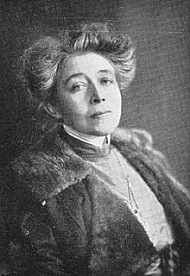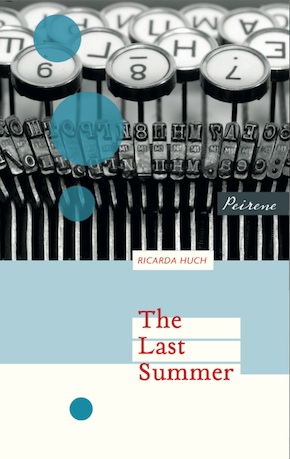Cloak and dagger à la Russe
by Mika Provata-CarloneThe family of Governor Yegor von Rasimkara, we are told early in Ricarda Huch’s The Last Summer, have only one defect all told: that of “belonging to an era that must pass” – in order to make room for the one impatiently keen to take its place.
A generally endearing walrus of a father in high office (not to be budged in matters of state), a seductively mature, affectionate mother and doting wife, and three children (two precocious daughters and a droll, smart son with “the soul of a Neapolitan fishing boy or a princely favourite”) are scared out of their wits at the prospect of an anarchist attempt against the Governor’s life. Out of their natural urban element, in a remote and quaint holiday spot of Imperial Russia, they come up with an ingenious plan: to engage a young man as the Governor’s secretary, bodyguard, or rarefied watchdog. The new secretary is seductively charming and highly objectionable at the same time, a quiet stream beneath whose waters an unstoppable flood lies vigilantly in wait. He is brilliant, highly educated, philosophical, heartlessly Manfredian. Lyu, the secretary “is an extraordinary man, soulless you could even say, if it is possible to use that word to describe an element that is pure force.” He is a young man who “never get[s] bored” for “wherever he is, man is at the centre of a mystery.”
In its 114 epistolary pages, The Last Summer brings this new, pure, soulless force and the weight of tradition to a standstill. Huch’s novel is one inhabited by secrets and men of superhuman quality, by women for whom men are “their immortals” and by men for whom the world is at a critical crossroads. Orders old and new are about to clash, just as hearts are about to break. The result is an impressive fusion of Tolstoy at his chattiest, Dostoevsky at his darkest, Turgenev at his most torrential and Chekhov at his most uncannily atmospheric. There are also inscrutable Turks selling paradisiac sweetmeats, who wouldn’t blink an eyelid if someone were to explode before their eyes.
We know from the start what is afoot. Huch’s aim is to explore and exploit tragic irony to its fullest effect and potential, creating as she does so a psychological study of irresistible tactility and attraction. “Did you expect me to pounce on my victim like a hungry cannibal, a hate-filled love rival or a cheated husband?” Lyu protests tongue-in-cheek to his accomplice. A near erotic obsessiveness, an almost animistic drive, lie behind extreme political radicalism, the kind of early 20th-century anarchism that Huch herself studied in detail in her critical biography of Bakunin. The letters between the various correspondents are like the scattered links of a broken chain, tantalisingly enticing the reader to piece together the right sequence, to re-forge all the connections and thus arrive at illumination: who, when, what, how, especially why, and where can one assign right and wrong, morality and crime? It is a thrilling tableau of ‘the world of yesterday’, its grandeur and fussiness, its omnipotence and fragility, its lustre and darkness. It is equally a particularly chilling, yet also amusing and almost fond ‘silhouette’ portrait of an arrogant modernity and youth for whom an uncritically determined end – “the ultimate, the absolute” – justifies any means. We don’t of course see any of the ‘downstairs’ or the ‘downtrodden’ for whom anarchists claim to raise their battle standards, or any of the about-to-rebel proletariat. This is the poised equivalent of an Edwardian novel, neither a Victorian heart-render nor a Modernist Molotov cocktail.
Modernity is not only a trait of character or the spirit of an age, it is also amusingly material… There are clever hints of Freudian temptation, accounts of the childish whims and adult aspirations of an entire generation.”
Yet The Last Summer is also a very serious, sharply written socio-political, even feminist treatise under the literary guise of a clever bal masqué. Very beautifully translated by Jamie Bulloch, this volume feels short and light, yet it is neither trivial nor lacking in substance and meatiness. There is a Screwtape Letters charm and sprightliness about The Last Summer, a menacing frivolity foreshadowing doom as well as a new dawn. We are told that “Lyu is like Apollo’s simple bow which never shoots a stray arrow… a picture of divine power, accuracy, and unscrupulousness.” In her portrayal of this inexorable agent of change, Huch achieves a fine balance between critical analysis and fascination, doubt and a certain sense of vision. Lyu is in many ways the post-Nietzschean superman, no longer content to rage in isolation on precipitous peaks, but dead set to challenge and shake the rising modernity to its foundations. Huch’s minimalist portrait of this new force of ‘cult personality’ or daemonic charisma, which was to dominate and define a revolution, two world wars and more beyond, is daring and edgy, almost terrifyingly palpable and ineluctable.
Modernity is not only a trait of character or the spirit of an age, it is also amusingly material, in the form of typewriters arriving in great majestic crates of a summer’s eve to replace potentially indiscreet secretaries; and cars with which to conquer and tame velocity, or be driven mad and commit suicide (as we learn was the common inevitable predicament of motorists at the time, according to contemporary medical authorities). There are clever hints of Freudian temptation, accounts of the lives, mores, childish whims and adult aspirations of an entire generation. Its metaphor throughout is that of a bright sun, scorching to death or granting yearned-for life.
There is old love and young love, the rites of passage into adulthood and to old age, into a new nationhood – or perhaps into nothingness and oblivion. There is youthful presumption and a sense of superior entitlement, mature recalcitrance and the demand for total obedience, and behind it all is the evil of a dualism between ethics and power, the ego and a sense of duty to one’s fellow men, the clash between office, public image, and private existence.
“When it comes to the state what counts are not feelings, but utility and necessity,” von Rasimkara writes in a letter meant to bring consolation to the mother of a young student rebel whom he has condemned to death. The Last Summer is indeed a discursive thesis on the question of mind over matter, reason vs. emotion, of a feeling community vs. an efficient governing body. Insightfully, these are positions shared by both extremes, by radicals and arch-conservatives alike. It is especially an unflinching questioning of the limits or limitlessness of human self-will and self-determination.
“Only God can change a man, or not even God,” we are told, yet man can remove a man – and perhaps even God Himself. The Last Summer is Miltonian with a late 19th-century sense of humour and an early 20th-century sense of dire premonition. The choice between a whole individual vs. iron will is the final distillation, together with surges of love and the imperturbability of cold murder. A final letter, a blank line, is the ultimate, climactic end, the enigmatic grin of a sinister or triumphant open-endedness.
Ricarda Huch is a ‘find’ for Peirene Press. Thomas Mann called her “the first lady of Germany, quite likely, in fact, of the whole of Europe.” She was certainly a feisty lady, with a doctorate from Zurich University, and belonging to an old, cultured patrician background. Fascinated by historical reversals, national renewal, and the dynamics of the avant-garde, Huch wrote studies on Romanticism and the Risorgimento, on Bakunin and Luther, and on religion. Shortly before her death in 1947, she began a study of German resistance to Hitler, of which only the first volume was completed. Contradictory and indomitable, she admired early anarchism as well as the rigour of Mussolini’s fascism, and chose to go into internal exile during the years of National Socialism.
Peirene prides itself for producing “two-hour books to be devoured in a single sitting,” according to the TLS. Huch herself demands that the two hours spent on this 114-page book be proper, Russian hours: deliciously indulgent, profoundly thoughtful and long, almost endless.
 Ricarda Huch (1864–1947) was a ground-breaking German historian, novelist and philosopher. As one of the first women to study at the University in Zurich, she received her doctorate in Philosophy and History in 1892. Alongside numerous works on European history, she also wrote novels, poems, and a play. Der Letzte Sommer (The Last Summer) was first published in 1910. In 1926 she was the first female writer to be admitted to the Prussian Academy of Arts. The Last Summer, translated by Jamie Bulloch, is out now in paperback from Peirene Press.
Ricarda Huch (1864–1947) was a ground-breaking German historian, novelist and philosopher. As one of the first women to study at the University in Zurich, she received her doctorate in Philosophy and History in 1892. Alongside numerous works on European history, she also wrote novels, poems, and a play. Der Letzte Sommer (The Last Summer) was first published in 1910. In 1926 she was the first female writer to be admitted to the Prussian Academy of Arts. The Last Summer, translated by Jamie Bulloch, is out now in paperback from Peirene Press.
Read more.
Jamie Bulloch is a historian and has worked as a professional translator from German since 2001. His previous translations for Peirene are Portrait of the Mother as a Young Woman by Friedrich Christian Delius, Sea of Ink by Richard Weihe, The Mussel Feast by Birgit Vanderbeke, winner of the 2015 Schlegel-Tieck Prize for German Translation, and The Empress and the Cake by Linda Stift.
@jamiebulloch
Mika Provata-Carlone is an independent scholar, translator, editor and illustrator, and a contributing editor to Bookanista. She has a doctorate from Princeton University and lives and works in London.


